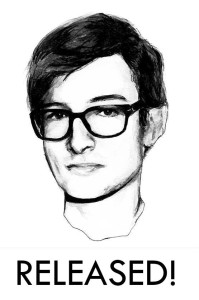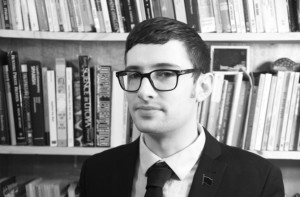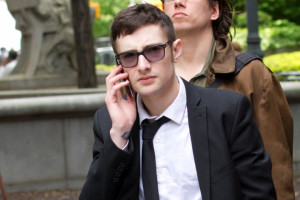 Jerry Koch spent 8 months in jail in New York City for refusing to testify before a federal grand jury. But a district court judge has ruled that imprisonment only strengthened the anarchist’s resolve, and the court had no choice but to release him.
Jerry Koch spent 8 months in jail in New York City for refusing to testify before a federal grand jury. But a district court judge has ruled that imprisonment only strengthened the anarchist’s resolve, and the court had no choice but to release him.
As I reported previously for VICE, Koch, 24, was subpoenaed before a grand jury investigating the 2008 explosion outside a military recruitment center in Times Square. The blast damaged only the front door of the center and injured no one, but the FBI began a “terrorism” investigation of local anarchists.
Koch isn’t accused of this crime—or any other crime. Prosecutors told his lawyers that they think he was at a bar in 2008 or 2009, after the bombing, and that someone else at the bar knew about another person who was involved. Koch was subpoenaed to a grand jury in 2009—when he was only 19—and publicly stated that he didn’t know anything about it and wouldn’t cooperate.
On May 21, he appeared before the grand jury again. And again, he refused to testify.
Grand juries are secretive proceedings that have historically been used to investigate, harass, and disrupt radical social movements. If you refuse to testify about your political beliefs, or others, you can be imprisoned for the duration of the grand jury.
The purpose of this imprisonment, under the law, is to “coerce” the prisoner into testifying. Koch’s attorney, Moira Meltzer-Cohen, submitted what’s known as a Grumbles motion that argued he would not, under any circumstances, cooperate.

It was a lengthy back-and-forth, but eventually judge John F. Keenan of Federal District Court in Manhattan agreed.
In a ruling full of snarky and petty insults against Koch and other anarchists, Keenan concedes that, “…Koch has chosen to remain in contempt — indeed, he promises continued and endless contempt.”
Keenan notes Koch’s deteriorating physical and mental health, and flippantly says that “…Koch will only derive increasing grim self-satisfaction from his position. The more unstable he gets, the more he will be presented as a martyr and perceive himself as such. Koch has already decided that this type of notoriety is more valuable than his health and freedom…”
Keenan was most swayed by 17 letters of support from family, friends, and academics about Koch’s beliefs, and also his public statements about his intentions (as an aside, it was wonderful to hear that the VICE article was included in this).
At one point, Koch was on 24-hour solitary lockdown in the SHU. He was not allowed to shower, or given any reading material. He was never told why he received such harsh treatment, but his transfer to the SHU coincided with a protest by his supporters, and staff at MCC confirmed that to him personally. A staff psychologist at the jail told Koch, “They are treating you like an inmate of 10 South [the Terrorism Unit].”

None of this swayed Koch, though.
In a declaration to the court, filed last year, Koch said:Â
“I want so badly to spend Christmas with my mother, in a place where I can move freely and sleep in peace. But the idea that I hold the keys to my cell is hollow. I know that cooperating with the Grand Jury will only increase my suffering. It will disappoint and alienate my community. It will undermine everything I believe in, and all I have sacrificed for.”
Similar statements were made by anarchists in the Pacific Northwest, who were also jailed for refusing to testify before a grand jury. Eventually they were released, and the judge cited the “strength of their convictions.”
Koch said in a statement that “I’ve lost more during my incarceration that I ever thought possible.” But he refused to be swayed by fear and intimidation; as Judge Keenan was forced to acknowledge, “Koch is governed by different incentives.”